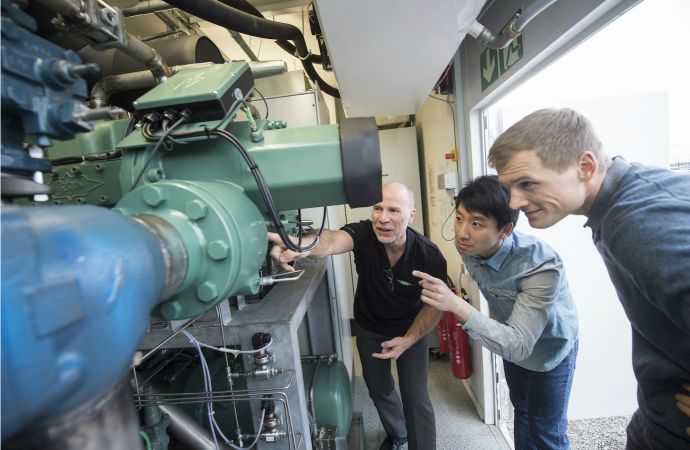Low training uptake is creating a long-term shortage of technicians trained to operate natural refrigerant systems and ultimately making it harder to deliver the EU's f-gas phase-down, warns an upcoming European Commission report.

Technicians receiving training at Bitzer's SCHAUFLER Academy
Low training uptake is creating a medium- to long-term shortage of technicians trained to operate natural refrigerant systems, making it harder to deliver the EU's f-gas phase-down targets, according to a draft European Commission report to be published under the EU’s F-Gas Regulation on reducing HFC consumption in Europe.
Training uptake ‘too low’
“It is clear that the currently known uptake of training is too low to match the medium and long-term requirements of the HFC phase-down,” says the report on the availability of training for service technicians regarding the safe handling of f-gas alternatives.
The EU executive surveyed 22 member states representing over 91% of the EU population. Ammonia training is available in 71% of them, but this natural refrigerant has been in use for decades. “Availability is much lower for other alternative refrigerants,” the report warns.
The report – set to be formally published by 1 January 2017 – reveals that just 0-2.3% of f gas-trained technicians in the 22 countries surveyed are also trained to use natural refrigerants CO2 and hydrocarbons.
CO2 training is available in 52% of the 22 countries surveyed. Training on small hermetic hydrocarbon systems is on offer in 48%, while just 35% offer training on using hydrocarbons in larger systems.
CO2 training lacking ‘in some regions’
In some regions, the lack of trained service providers is directly leading some end users to opt against converting from HFCs to alternative refrigerants – and particularly to the use of CO2 for commercial refrigeration.
The Commission cites uneven geographical distribution of training centres and the fact that “micro-enterprises are so dominant” among other barriers to wider training in CO2 and hydrocarbons. “It is relatively hard for very small companies to fund the training required in the wide range of alternatives that are becoming available,” the report states.
It is clear that the currently known uptake of training is too low to match the medium and long-term requirements of the HFC phase-down."
- European Commission
Despite reporting “good availability” of materials for theoretical training, the Commission identifies “a considerable shortage of practical training facilities for hands-on training on relevant equipment in some regions”.
To help solve the issue, the Commission calls for the introduction of ‘train-the-trainer’ programmes to address geographic imbalances. It also stresses the key role to be played by big end users like supermarkets, for example by requiring only trained technicians to work with their systems.
National authorities could also fund training programmes, the report suggests.
Key manufacturers taking action
Despite the EU executive’s bleak assessment, some manufacturers of natural refrigerant systems and components have been actively training technicians for some time now.
Carrier opened a training facility for CO2 refrigeration, the CO2OLacademy, in the German city of Mainz in March 2015. Also in Germany, compressor giant Bitzer inaugated the SCHAUFLER Academy, an international training centre located in Rottenburg, in February 2016.
Kim G. Christensen, managing director of Danish CO2 system manufacturer Advansor – which also conducts training – refutes the notion that lack of training is a barrier to wider uptake of CO2 solutions in particular.
“The story that there isn’t enough CO2 training capacity is a lie,” Christensen said. He urges retailers and contractors in areas without access to local training to visit existing facilities elsewhere.
Alongside Bitzer, Carrier and Advansor’s own offerings, he cites courses at universities in France and Belgium and refrigeration schools in Denmark and Sweden among the options currently available.
The Commission report, meanwhile, concludes that measures in place governing the use of HFC replacements are sufficient to ensure their safety.
“The legislative framework complemented by existing standards at the European level appears appropriate to assure safe handling of such equipment where these rules are followed,” states the report, concluding that further EU legislative action is “not appropriate at this time”.
MORE INFORMATION
Related stories



